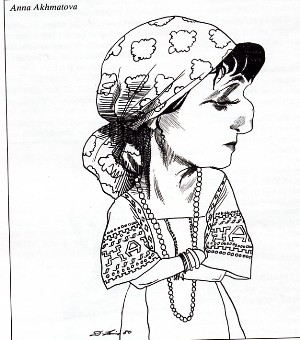 Thơ Akhmatova Trang Akhmatova |
  TO THE
MUSE My
Muse-sister kept on
looking Muse!
See how happy they
feel- I know:
I too will have to
turn I burn
a candle in the window Tomorrow,
mirrors will sneer:
"We're not fond 1912
When
ravines rustle and
burdock roams I
return. The fluffy cat
doesn't glower: Sometimes
there's sound for a
moment or more - 1912 As I
die, I long for
immortality. Tell
lies while crawling,
thick and fast If in
the journey to that
stronghold, The
deadly hour will offer me 1912 …. As a theme, death is a good
litmus test for a poet's ethics. The "in memoriam" genre is
frequently used to exercise self-pity or for metaphysical trips that
denote the
subconscious superiority of survivor over victim, of majority (of the
alive)
over minority (of the dead). Akhmatova would have none of that. She
particularizes her fallen instead of generalizing about them since she
writes
for a minority with which it's easier for her to identify in any case.
She
simply continues to treat them as individuals whom she knew and who she
senses
wouldn't like to be used as the point of departure for no matter how
spectacular a destination. Naturally enough, poems of
this sort couldn't be published, nor could they even be written down or
retyped. They could only be memorized by the author and by some seven
other
people since she didn't trust her own memory. From time to time, she'd
meet a person
privately and would ask him or her to recite quietly this or that
selection as
a means of inventory. This precaution was far from being excessive:
people
would disappear forever for smaller things than a piece of paper with a
few
lines on it. Besides, she feared not so much for her own life as for
her son's
who was in a camp and whose release she desperately tried to obtain for
eighteen years. A little piece of paper with a few lines on it could
cost a
lot, and more to him than to her who could lose only hope and, perhaps,
mind. The days of both, however,
would have been numbered had the authorities found her "Requiem," a
cycle of poems describing an ordeal of a woman whose son is arrested
and who
waits under prison walls with a parcel for him and scurries about the
thresholds of state's offices to find out about his fate. Now, this
time around
she was autobiographical indeed, yet the power of "Requiem" lies in
the fact that Akhmatova's biography was too common. This Requiem mourns
the
mourners: mothers losing sons, wives turning widows, sometimes both as
was the
author's case. This is a tragedy where the choir perishes before the
hero. The degree of compassion with
which the various voices of this "Requiem" are rendered can be
explained only by the author's Orthodox faith; the degree of
understanding and
forgiveness which accounts for this work's piercing, almost unbearable
lyricism,
only by the uniqueness of her heart, her self and this self's sense of
Time. No
creed would help to understand, much less forgive, let 'alone survive
this
double widowhood at the hands of the regime, this fate of her son,
these forty
years of being silenced and ostracized. No Anna Gorenko would be able
to take
it. Anna Akhmatova did, and it's as though she knew what there was in
store
when she took this pen name. At certain periods of history
it is only poetry that is capable of dealing with reality by condensing
it into
something graspable, something that otherwise couldn't be retained by
the mind.
In that sense, the whole nation took up the pen name of Akhmatova-which
explains her popularity and which, more importantly enabled her to
speak for
the nation as well as to tell it something it didn't know. She was,
essentially, a poet of human ties: cherished, strained, severed. She
showed
these evolutions first through the prism of the individual heart, then
through
the prism of history, such as it was. This is about as much as one gets
in the
way of optics anyway. These two perspectives were
brought into sharp focus through prosody which is simply a repository
of Time within
language. Hence, by the way, her ability to forgive-because forgiveness
is not a
virtue postulated by creed but a property of time in both its mundane
and
metaphysical senses. This is also why her verses are to survive whether
published or not: because of the prosody, because they are charged with
time in
both said senses. They will survive because language is older than
state and
because prosody always survives history. In fact, it hardly needs
history; all
it needs is a poet, and Akhmatova was just that. -JOSEPH BRODSKY: The Keening Muse Bài này, được dùng là Tựa cho tập thơ của
Anna Akhmatova, khi được in trong Less
than One, có tên như trên
|